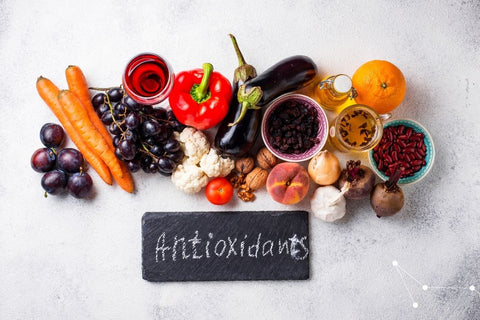Where are antioxidants found?
Antioxidants are found in certain foods, and may include various vitamins and minerals. Sources with strong antioxidant activity include Vitamin C, Vitamin E, Selenium, Carotenoids (beta-carotene, lycopene, lutein and zeaxanthin), Polyphenols and Flavonoids. Antioxidants are also used as preservatives in food production to assist in increasing shelf life.
How do antioxidants work?
Antioxidants are molecules that help fight free radicals within the body. They do so by donating an electron to free radicals, stabilising them and reducing their capacity to cause damage. Free radicals are naturally formed in the body during exercise or when energy is metabolised from the food we consume. Environmental triggers such as cigarette smoke, air pollution, and UV radiation (from sunlight) can increase our exposure to free radicals. Free radical production can also be caused by diets high in fat, sugar and alcohol content.
What are free radicals?
Free radicals are oxygen containing molecules that have an uneven number of electrons. This uneven number allows them to react with other molecules more easily, causing chain reactions in the body known as oxidation.
Oxidative stress occurs when the balance between antioxidant defence and free radical generation is unfavourable. This imbalance may result in damage to lipids, proteins and nucleic acids in the body. It has also been thought to play a role in diseases including Alzheimer’s disease, Parkinson’s disease, cardiovascular disease, cancer, diabetes, age-related macular degeneration and diseases of the eye including cataracts.
Free radicals may also play a role in important functions within the body. For example, to fight off infections, our immune cells often produce free radicals. Some known stressors, as well as lifestyle and environmental factors can promote oxidative stress and result in excessive free radical formation. Common sources of increased free radicals include:
- Air pollution
- Cigarette smoke
- Alcohol intake
- Toxins
- High blood sugar levels
- An increased intake of saturated fat
- Excessive sunbathing and UV radiation exposure
- Infections (bacterial, viral, fungal)
- Iron, magnesium, copper or zinc intake in excess of the recommended intake (RDI)
- Too little or too much oxygen in the body (e.g. from breathing 100% oxygen)
- Tissue damage caused by excessive exercise
- Deficiency in antioxidant intake
Increasing consumption of natural sources of antioxidants as part of the daily diet may be an important parameter in the prevention of chronic diseases associated with ageing and oxidative stress.
Saturated fatty acids found in meat are high susceptible to oxidation and production of free radicals. The accumulation of these toxins leads to rancidity, a decrease in the nutrient value of the food and increased risk to health. Incorporating natural antioxidants in these foods, for example by applying extracts from plants like cinnamon and cloves to precooked meats can minimise the formation of chemical toxins, increasing shelf life and nutritional status. The same can be done to enhance the stability of oils used for human consumption as well as baked goods.
Important dietary sources of antioxidants include:
- Berries
- Citrus fruit
- Cherries
- Dark leafy green vegetables
- Broccoli
- Carrots
- Tomatoes
- Olives
- Fish
- Nuts
- Onion
- Garlic
- Cinnamon
- Green tea
- Turmeric
Lifestyle choices that can help to reduce or prevent oxidative stress include:
- Regular exercise performed at a moderate intensity: exercise has been shown to naturally increase antioxidant levels and decrease oxidative stress damage.
- Avoiding smoking
- Avoiding exposure to chemicals used at work and in the house
- Decreasing alcohol intake
- Ensuring adequate sleep
- Avoiding over consumption of food
- Avoiding sunlight exposure in the middle of the day and being sun smart (apply sunscreen and use protective clothing)
- Supplementing with or increasing natural production of melatonin
What about the safety of antioxidant supplementation?
Intake of dietary antioxidants are essential for optimal human health, however research has shown that supplementation with high-dose antioxidants can be harmful in certain cases. Recent studies have shown an increased risk of lung cancer in smokers linked to use of high-dose beta-carotene supplements and an increased risk of stroke (related to brain haemorrhage) and prostate cancer with high dose Vitamin E supplementation.
High dose supplementation with antioxidants may also interact with certain medications so it is important to ensure you speak to your healthcare professional or GP before you decide to use them.
References:
- Goñi, I., & Hernández-Galiot, A. (2019). Intake of Nutrient and Non-Nutrient Dietary Antioxidants. Contribution of Macromolecular Antioxidant Polyphenols in an Elderly Mediterranean Population. Nutrients, 11(9), 2165. https://doi.org/10.3390/nu11092165
- Gordon M. H. (2012). Significance of dietary antioxidants for health. International journal of molecular sciences, 13(1), 173–179. https://doi.org/10.3390/ijms13010173
- Hajhashemi, V., Vaseghi, G., Pourfarzam, M., & Abdollahi, A. (2010). Are antioxidants helpful for disease prevention?. Research in pharmaceutical sciences, 5(1), 1–8. https://www.ncbi.nlm.nih.gov/pmc/articles/PMC3093095/
- Liu, Z., Ren, Z., Zhang, J., Chuang, C. C., Kandaswamy, E., Zhou, T., & Zuo, L. (2018). Role of ROS and Nutritional Antioxidants in Human Diseases. Frontiers in physiology, 9, 477. https://doi.org/10.3389/fphys.2018.00477
- Lobo, V., Patil, A., Phatak, A., & Chandra, N. (2010). Free radicals, antioxidants and functional foods: Impact on human health. Pharmacognosy reviews, 4(8), 118–126. https://doi.org/10.4103/0973-7847.70902
- National Center for Complementary and Integrative Health. Antioxidants: In depth - https://www.nccih.nih.gov/health/antioxidants-in-depth
- Lourenço, S. C., Moldão-Martins, M., & Alves, V. D. (2019). Antioxidants of Natural Plant Origins: From Sources to Food Industry Applications. Molecules (Basel, Switzerland), 24(22), 4132. https://doi.org/10.3390/molecules24224132



